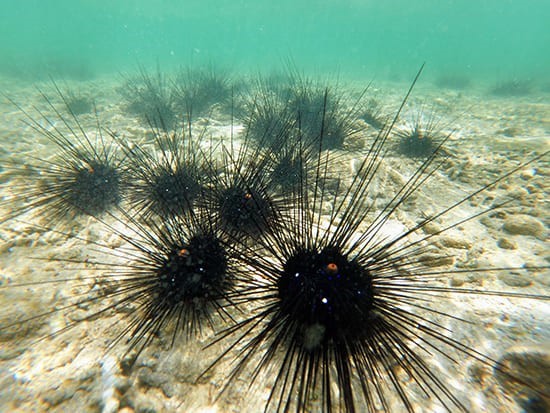AMMAN — A research team has recently found that an epidemic
in the Red Sea spread and wiped out an entire species of sea urchins in the
Gulf of Aqaba, an endangerment to the region’s unique coral reefs.
اضافة اعلان
According to a research team from Tel Aviv University, the
Black Sea Urchins were completely exterminated two months after the epidemic
began, a species known to help maintain the health of coral reefs.
In its findings published in two scientific journals, the
epidemic is also spreading to other countries in the region in addition to
Jordan, which include Egypt, and Saudi Arabia.
Here is what experts told
Jordan News:
A carpet parasiteResearchers believe that the cause of epidemic is due to the
carpet parasite, which causes disease to marine life and its rapid death. This
same cause could be linked to the deaths of sea urchins in the Caribbean Sea as
well.
Dr Ali Al-Sawalmih, director of the Marine Science Station
in Aqaba, told
Jordan News that studies have documented the death of large
quantities of sea urchins in the Aqaba Gulf and the Mediterranean Sea due to a
bacterial infection transmitted through sea currents and fish that feed on
them.

He explained this phenomenon occurs only in oceans with a
similar reoccurrence in the 1980s.
He stressed that the current study conducted about the
disappearance of sea urchins, has consequences for the marine environment
system as sea urchins help balance the balance the system.
The imbalance could lead to an increase in algae growth, a
decrease in the components of coral reefs, a decrease in their regeneration,
and an impact on the nutrient cycle in the sea.
Studies still underway
Deputy Chief Commissioner of Aqaba Special Economic Zone
Authority Hamzeh Al-Hajj Hassan told
Jordan News that the authority is
conducting studies and research with experts in Aqaba to understand and study
this phenomenon.
He confirmed that he personally dove recently and noticed
that urchins began to breed, “a symbol of hope in regenerating the marine life
population”.
The importance of sea urchins
Dean of the College of Marine Sciences, Dr Mohammad
Al-Zibdah, told
Jordan News that this particular species of sea urchin, feeds
on large algae, so “its disappearance may lead to an increase in algae and thus
prevent corals from reproducing due to competition for space”.
He added that the urchins remove the algae that stick to the
coral larvae and to the stony substrates at the bottom.
Also, the presence of algae when the urchins are absent may
lead to the erosion of coral structures and thus become weak and may die.
He added that the measures to be taken to preserve urchins
are through the work of proactive monitoring programs to search for the
presence of influences that may harm the presence of these creatures, such as
searching for diseases, one of them being bio restoration.
In order to move forward with a solution, “it would require
cooperation between stakeholders, research, administrators, and the local
community to prevent these epidemics in the future”.
Read more Features
Jordan News



